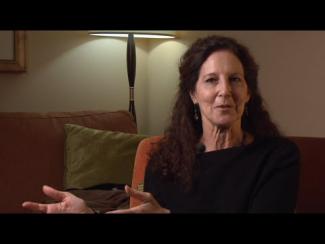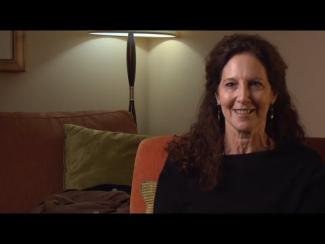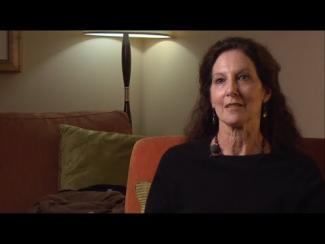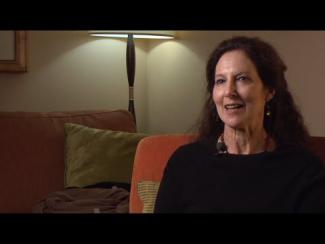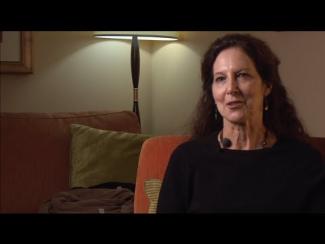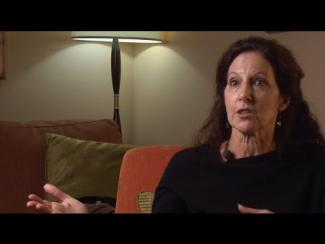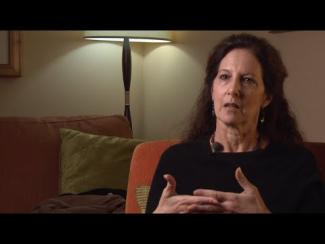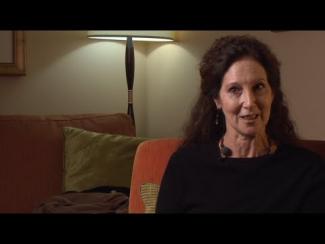The Yiddish Book Center's
Wexler Oral History Project
A growing collection of in-depth interviews with people of all ages and backgrounds, whose stories about the legacy and changing nature of Yiddish language and culture offer a rich and complex chronicle of Jewish identity.
Elissa Samberg's Oral History
Elissa Samberg, native of Philadelphia and mother of two, was interviewed by Isaac Daniel Moore on December 15, 2014 at the Association for Jewish Studies Conference in Baltimore, Maryland. Elissa grew up in Bucks County on the outskirts of Philadelphia in what she describes as "a split world of the Old Country and pre-war Americana." She lived in her grandmother's world in her parents house. Elissa begins the interview describing her family background. Her father's family came to the United States from Russia before World War Two. Her mother's family is from Romania, Lithuania, and Russia. They also moved to the United States prior to the outbreak of World War Two. Elissa's discusses how her grandparents on her mother's side of the family played an important part in her childhood and how she sees this interview as a tribute to them. She tells the story of how her parents met on the boardwalk in New Jersey. Her mother had a job in a candy story and her father would walk in front of the store everyday, until he worked up the nerve to finally ask her out; they were engaged two weeks later. Born in 1956, Elissa describes how she gravitated toward her grandparents while her siblings were embracing modernity in America. She mentions as an example that she didn't know who Bob Dylan was until she was in her forties. When she was ten her mother fell gravely ill and her grandparents raised her. She remembers grocery shopping with her grandparents on Saturdays and going to the fish and meat markets. Growing up in her grandparents' world of the synagogue and Yiddish, Elissa discusses how she didn't feel like she fit in with her siblings. Elissa talks about her family home and recalls how it was filled with her many brothers, her grandparents, and always smelled like fried onion. Elissa characterizes the culture of the home as "naturally Jewish" and recalls how there were only three ingredients for everything: "a bit of garlic, onion, and salt and pepper." She recalls how after dinner, the family would have tea and dessert and "everyone would kibits and kibits (gossip and gossip)." Elissa describes how her grandparents influenced the culture of the home she grew up in, a home steeped in Yiddish culture. She tells many stories of her grandfather meeting her after school everyday and walking her home, sneaking shots of "peppermint schnapps" and being in what she terms a "warm and safe environment" with her grandparents. Elissa also describes her childhood synagogue, which was founded by her parents in the 1950s, as the epicenter of her world. It was an old building where Elissa recalls finding comfort in the soothing voices of the congregation praying and chanting. Elissa tells a particular story of how a Mr. Krakower helped her with her Bat Mitzvah and how after the ceremony he shared the seven mistakes she had made in the reading. Toward the end, Elissa discusses feeling strongly connected to Yiddish and the Yiddish world her grandparents lived in and wanting to return to it. For her, the connection to Eastern European Jewish heritage and Yiddish is what defines her Jewish identity. Elissa talks about how the relationship between her and her grandchildren is different from the one between her and her grandparents. She feels that something is lost when grandparents and grandchildren aren't so close. Elissa discusses how she wants to practice Yiddish as she has no place to practice in Pennsylvania. Elissa finishes the interview by reading an eulogy she wrote for her grandmother she had never publicly shared before.
This interview was conducted in English.
Elissa Samberg was born in Philadelphia, Pennsylvania in 1956.

